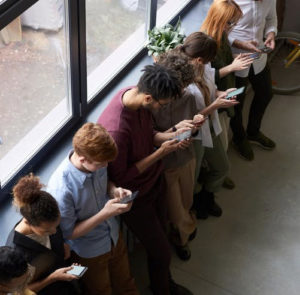 We all experience moments of nervousness around social situations, whether it be before a class presentation, a job interview, a first date, etc. However, Social Anxiety Disorder (Social Phobia) is much more frequent, can occur in many social situations, is often more intense, and can cause a person to avoid social situations all together.
We all experience moments of nervousness around social situations, whether it be before a class presentation, a job interview, a first date, etc. However, Social Anxiety Disorder (Social Phobia) is much more frequent, can occur in many social situations, is often more intense, and can cause a person to avoid social situations all together.
Some symptoms of Social Anxiety include:
- Intense fear of ridicule in social situations
- Fear of others noticing your anxious behavior (resulting in more ridicule)
- Avoiding social situations that are fearful, or enduring them with intense anxiety
- Fear that is greater than the real threat
- Fear that causes distress and impacts with everyday life
- Fear that lasts for 6 months or longer
However, there are some misconceptions about social anxiety…
One of these misconceptions is that people with social anxiety don’t like to talk. This is untrue. Many people with social anxiety love to talk and have conversations with people. However, in new, unfamiliar, or in large groups of people it is difficult for them to talk because of their fear of being judged by others. It can be a bit easier to have a conversation once a person with social anxiety becomes familiar with a person.
 Not all social anxiety looks the same. There are people for whom this fear is only present in public speaking situations, but are fine in a job interview or on a date Some people are better one on one, and get anxious in crowds, and so on. It all depends on the person.
Not all social anxiety looks the same. There are people for whom this fear is only present in public speaking situations, but are fine in a job interview or on a date Some people are better one on one, and get anxious in crowds, and so on. It all depends on the person.
Another misconception is that people with social anxiety are using it as an excuse to get out of certain situations. Though it may seem that way, often times people with this disorder have a hard time coming up with words or things to say, their mind seems to “go blank,” they may be so fearful that they may struggle to listen in or hear anything in the conversation, and a person may freeze in their tracks, or run away in fear in these situations.
 This disorder is real and feels very real to the person experiencing it. In some cases social anxiety can cause a person to feel debilitated and unable to participate. It ranges in severity, but there is treatment.
This disorder is real and feels very real to the person experiencing it. In some cases social anxiety can cause a person to feel debilitated and unable to participate. It ranges in severity, but there is treatment.
There is Hope—it doesn’t have to be this way!
The good news is, if you have social anxiety or think you might have it, there is help. You
can always make an appointment with a therapist at Threads of Hope Counseling who are trained
and ready to help you! Social Anxiety is real and can be very difficult to deal with alone. With help from a good professional, you can learn to better cope and take control of your life again!
March 2020, Mikayla Nelson, Counseling Intern, Osseo Office
